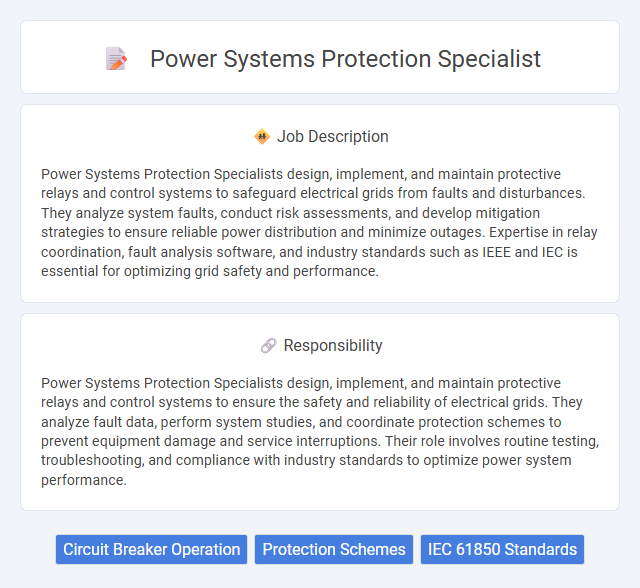
Power Systems Protection Specialists design, implement, and maintain protective relays and control systems to safeguard electrical grids from faults and disturbances. They analyze system faults, conduct risk assessments, and develop mitigation strategies to ensure reliable power distribution and minimize outages. Expertise in relay coordination, fault analysis software, and industry standards such as IEEE and IEC is essential for optimizing grid safety and performance.
Individuals with strong analytical skills and a keen attention to detail are likely suitable for a Power Systems Protection Specialist role, as it demands precise monitoring and fault diagnosis. Those comfortable with high-pressure situations and complex problem-solving may find this job aligns well with their abilities. Candidates who lack technical aptitude or struggle with critical thinking might face challenges in meeting the job's requirements effectively.
Qualification
A Power Systems Protection Specialist must have a deep understanding of electrical engineering principles, particularly in power system analysis, relay coordination, and fault detection techniques. Proficiency in software tools such as ETAP, PSCAD, or DIgSILENT PowerFactory is essential for designing and testing protection schemes. Certification in IEEE standards and experience with SCADA systems further enhance the specialist's qualifications, ensuring reliable and safe operation of electrical power networks.
Responsibility
Power Systems Protection Specialists design, implement, and maintain protective relays and control systems to ensure the safety and reliability of electrical grids. They analyze fault data, perform system studies, and coordinate protection schemes to prevent equipment damage and service interruptions. Their role involves routine testing, troubleshooting, and compliance with industry standards to optimize power system performance.
Benefit
Power Systems Protection Specialists likely enhance grid reliability by designing and implementing advanced protection schemes that reduce the risk of outages. Their expertise probably leads to improved equipment lifespan and operational efficiency, minimizing costly downtime. These professionals may also contribute to increased safety for personnel and infrastructure through precise fault detection and isolation.
Challenge
Power Systems Protection Specialists likely face the challenge of quickly diagnosing and mitigating faults within complex electrical networks to prevent widespread outages. They probably need to stay updated with evolving technologies and standards to ensure the protection schemes remain effective against emerging threats. Balancing reliability and safety under high-pressure situations is expected to be a demanding aspect of the role.
Career Advancement
Power Systems Protection Specialists enhance grid reliability by designing and implementing protection schemes to prevent equipment damage and ensure operational safety. Career advancement opportunities often lead to senior engineering roles, project management, and specialized consultancy positions within utilities and energy firms. Mastery of advanced protection relays, fault analysis software, and regulatory compliance positions professionals for leadership and strategic planning responsibilities.
Key Terms
Circuit Breaker Operation
A Power Systems Protection Specialist specializing in Circuit Breaker Operation ensures reliable fault isolation and system stability by managing the precise control and coordination of circuit breakers. Expertise in relay settings, fault analysis, and breaker timing tests plays a critical role in preventing equipment damage and minimizing power outages. Proficiency with advanced protection schemes like differential protection and SCADA integration enhances operational safety and grid resilience.
Protection Schemes
Power Systems Protection Specialists design and implement advanced protection schemes to safeguard electrical grids from faults and disturbances. They analyze relay coordination, fault detection, and system isolation techniques to ensure reliability and minimize outage risks. Expertise in differential, distance, and overcurrent protection schemes is essential for optimizing system stability and operational safety.
IEC 61850 Standards
Power Systems Protection Specialists ensure the reliability and safety of electrical grids by implementing advanced protection schemes based on IEC 61850 standards, which define communication protocols for intelligent electronic devices. Expertise in IEC 61850 enables seamless data exchange, interoperability, and real-time monitoring within substation automation systems, enhancing fault detection and isolation processes. Proficiency in configuring, testing, and maintaining IEC 61850-compliant devices is essential for minimizing power outages and optimizing grid performance.
 kuljobs.com
kuljobs.com